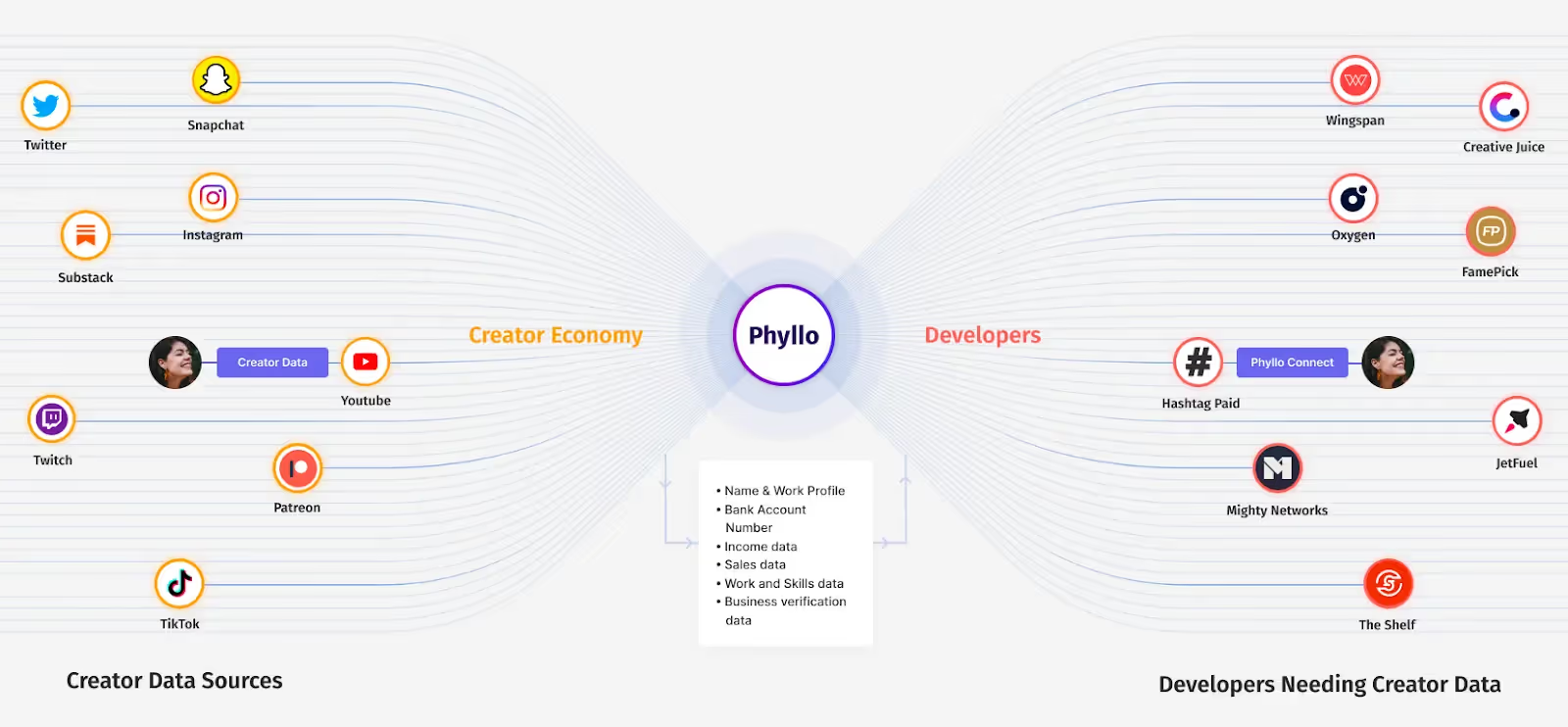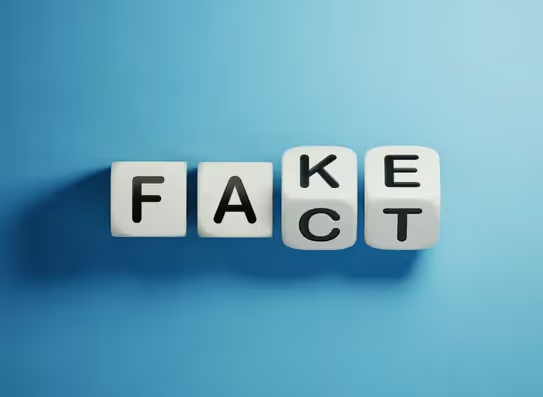It's no secret that the media landscape is changing by the minute.
Today, over half the world’s population (59%) uses social media for news, entertainment, and information. This shift has created a new kind of economy - one where anyone and everyone can be a creator.
And as with any new industry, there are bound to be growing pains as creators, platforms, businesses, and consumers alike try to figure out how best to navigate this new world order.
One of those growing pains has been around for some time now — authority and authenticity in the creator economy. With so many voices competing for our attention online, who do we trust? How do we know what's real? And how do we separate fact from fiction?
Why is this information important?
In the creator economy, creators are brands.
And these “brands” are built on the creator’s credibility. This is the capital that these “brands” thrive on. It’s the ability to build and create something that inspires people to come together around it.
The sum total of all of the audience’s interactions with the creator amounts to their credibility. It’s their likes, retweets, shares, and comments. It’s subscriptions to their YouTube channel or newsletter list, purchases of their products, or tickets to events.
And to get paid as a creator, you need to have at least some credibility. You need to be able to prove that you have an audience that will follow you around; that they won’t just watch one video or listen to one song — they will stick around because they want more of what you have to offer.
Today, creators need a standard identity as well as a transferable value across multiple platforms and products. And the actual numbers behind these creators are critical for platforms and businesses that thrive in symbiosis with this new ecosystem.
This includes data to -
- Verify a creator’s identity
- Access a creator’s proof of work, i.e. engagement
- Access a creator’s audience demographics data
- Verify a creator’s income from multiple sources, among many others

But, how do you know what is real and what isn’t?
Take influencer marketing for example. The influencer economy is a $16.4 billion industry with huge potential to reach new audiences. But it’s also a murky world with no standard way of measuring influence or success.
This is especially true for agencies and brands that work with multiple platforms or networks. The ability to see all of the necessary verified information in one place would help streamline processes, improve efficiency, and provide insight into what works best across platforms.
There are plenty of examples where influencers have been found guilty of inflating their numbers artificially — both on their own platforms and elsewhere.
In fact, it was found that around 55% of Instagram influencers were involved in some form of social media fraud and fakery in 2020. And sniffing the truth out in this domain is harder than it seems - even for the bigger brands with tons of resources. In 2018, powerhouses like Pampers and Olay topped the list of brands with the fakest followers among their paid influencers - Pampers with 32% and Olay with 19%.
This is an issue that has plagued the industry for years now.
Nevertheless, how is this needed data usually collected?
We are in the midst of a data explosion. The need to harness this data and make sense of it has become a hot topic, especially in the creator economy. But are businesses getting all this needed information?
There are three main ways of getting data - Data scraping, Secure login, and API integration.
Data Scraping
Data scraping is when you extract data or other valuable information from a website or application. This is often done by bots or programs, but can also be done manually. You can scrape all kinds of publicly available information from blogs, social media pages, and other websites.
However, data scraping has its own set of drawbacks -
- Most social media platforms discourage scraping. Thus, the data quality is irregular and unreliable.
- Data scraping only caters to publicly visible data but not private information such as post impressions, which is an essential metric for many brand engagement/CPM calculations.
- As data scraping doesn’t get information directly from the source, the audience profiles are approximations and vary from one third-party provider to another for the same creator.
- Developers have no way of knowing if the data they’re using from one product is accurate in another. Thus, creator verification becomes another manual process altogether.
Secure Login
This is when someone logs into an account on a website in a secure login environment, gives permission for you to access their information and then you download it from their profile page on the site.
The advantage here is that you don't have to worry about scraping errors.
The disadvantage, however, is that many platforms are increasingly growing against the concept of social login and are thus making secure logins more and more difficult with each passing day, making it a non-reliable solution. Furthermore, users may change their minds about giving out this information later on down the road which could cause problems for your business if they decide not to cooperate with future requests for data.
API Integration
A secure and consent-driven way of getting creator data is leveraging API integrations of various platforms.
Many social media platforms, like Instagram, have provided a layer of APIs with which one can integrate. This approach provides you with consent-driven, first-party data of creators, including post-login/private data.
However, every platform’s API demands different processes of integration and functioning. Thus, creating a separate infrastructure for integrating with each platform is a costly and time-consuming process. Moreover, developers will also need to take care of the various consent-related restrictions of these platforms.
We’ll discuss more about Phyllo’s hassle-free solution that provides a single API to access the first-party data of creators from multiple source platforms in the following sections.
Traditionally, why is it difficult to gather this information?
In today's world, the most valuable resource is data. If you have it, you can do almost anything. If you don't, you might be missing out on a huge growth opportunity. The problem is that many businesses struggle to get their hands on this data in an easily digestible format. Here are three reasons why -
They don't know where to look
Data isn't always easy to find, especially if it's buried within someone else's platform or website.
The creator landscape is vast and asymmetric. And so, most creators have several sources of truth. Content today is created and distributed on multi-channel networks, each with its own set of policies.
One might need special access rights or credentials to get at certain bits of information. Some of this information may even be proprietary or locked up in databases that aren’t accessible by third parties.
They don't have the time and resources to gather all the information they need
It takes days or weeks to compile all this data from different sources and put it into one place. A lot of companies don't have time for that, especially when they're busy running their own businesses.
All this data is siloed in different software systems that operate independently from one another. If one tool doesn't have enough information from another tool, it can leave gaps in necessary reporting — or worse yet, lead companies astray when making decisions about strategies.
Today, developers of the creator economy are no longer building for a single platform, but instead for a multitude of platforms.
Developers are lost in creating and managing separate APIs, each of which provides only partial access to the data they need. This has led to a fragmented landscape where each player creates their own siloed experience, based on their own vision of how the creator economy should work. And as more platforms emerge, it will only get harder.
That's why we're seeing so many new developers struggling with the same problems - authentication, authorization, and data synchronization across multiple platforms.
TL;DR - it creates a fragmented landscape where multiple sources of truth exist, each with its own limitations and issues.
They don't know how to interpret it
The issue is not just that we have too much data, but that in today's world, it's hard to know what it says.
Some people aren't good at reading numbers, charts, and graphs; others may not know how to compare two pieces of information side by side and draw conclusions from them (or even spot patterns).
Let’s face the reality!
Having a single source of truth will help bring consistency to creator data and make it easier to verify that this data is correct at all times. Nevertheless, the idea of a “master database” would disrupt the very autonomy that this industry is based on.
So, as businesses work towards empowering creators, it’s difficult to pick one - convenience for the functioning of one’s business or upholding the core concept of autonomy in this industry.
The battle for the single source of truth is between creators and platforms, as well as platforms and other platforms.
The creator economy exists on a delicate balance that requires careful attention so we can enjoy the benefits of both freedom and centralization. We need to collectively break away from the myth of the “unified social network” - there will never be one social network to rule them all.
Enter Phyllo as the best solution to this battle for the single source of truth in the creator economy
The better and more practical solution is to adopt a data verification and authentication system that allows creators to prove their identity, reach, engagement, finances, and ownership of content across multiple platforms.
Phyllo solves this problem by acting as a single source of truth where all applications can access information about your data, such as when it was created and who created it.
Phyllo is a data gateway to creator economy platforms.
Using Phyllo, your users can grant access to their data within your app. Once granted access, you can fetch details of a creator's identity, income, and activity & engagement on platforms (like Instagram, YouTube, Twitch, Substack, and more) using our REST APIs.

With Phyllo, you can -
- Get access to a single API pipe to integrate with multiple creator platforms, whether they provide public APIs or don't.
- Take away the headache of integration, version maintenance, platform permissions, and relationships.
- Simplify the integration process by normalizing API responses across various data attributes.
- Secure the data following industry best practices of encryption, data protection, and infra security.
Wrapping up
The world is changing at a breakneck pace, and it's becoming harder to keep up with what's new and what's next. But there's one thing we can count on - the Creator Economy will continue to grow. That means more creators, more platforms, and more APIs.
However, keeping up with this electric growth and expansion might sometimes mean missing out on opportunities to create more value for audiences and make more money doing it.
As an industry, we need to move past this fragmented model and towards a more collaborative approach that allows all players — creators, developers, and businesses — to better leverage the collective efforts while ensuring we provide consumers with consistent experiences across any device or platform they choose to engage on.
That is exactly why we built (and continue to build) Phyllo. We want you to get continuous access to verified, creator-consented data across hundreds of platforms without any hassle so you can focus on building your product that can empower this new and budding ecosystem.
To learn more about how Phyllo can empower your business in the creator economy, please schedule a call with us.
Want to test the waters before you go ahead? Sign up for a free account to access creator data with Phyllo APIs.









